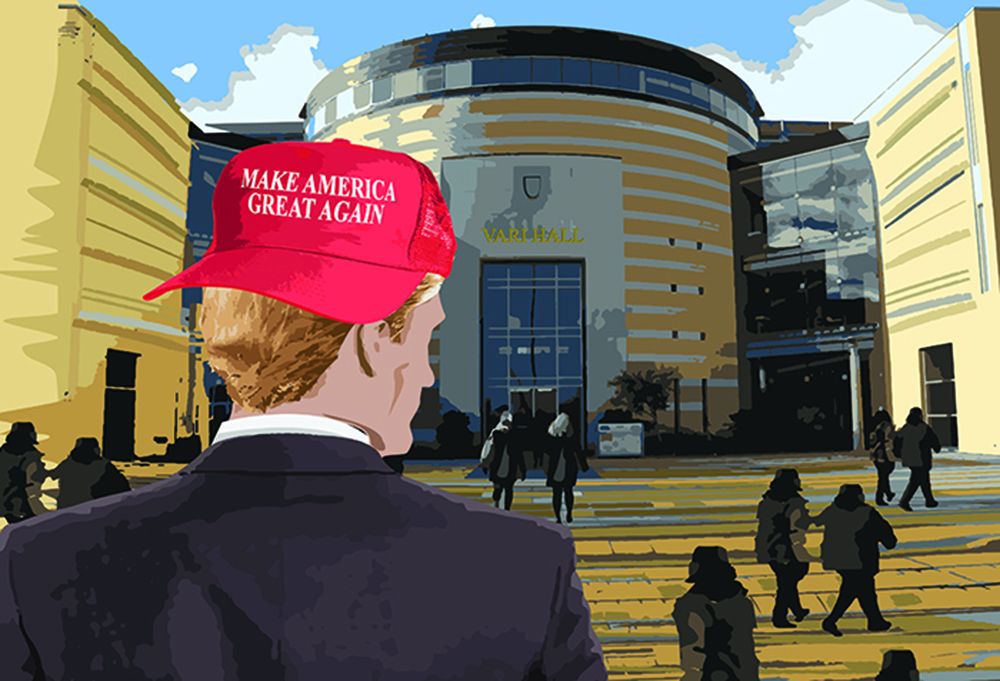Kanchi Uttamchandani and Alex Kvaskov | News Team
Featured illustration by Christopher Lai and Amir Yazdanparast
“I felt a great disturbance in the Force; it was as if a million voices had cried out in terror and were suddenly silenced.” – Obi-Wan Kenobi, Star Wars: Episode IV – A New Hope.
Indeed, the disturbance was liberals’ heads exploding as Trump’s win silenced every pundit and naysayer who said he couldn’t possibly win.
On election night, liberals across the country grew increasingly anxious as Trump won state after state, capturing the big swing state prizes of Florida and Ohio. They likely reached for a stiff drink when news came in that Trump had taken North Carolina.
And some may have even thought of popping cyanide pills as Trump eventually won the traditional democratic stronghold states of Wisconsin and Pennsylvania. Indeed, calls to suicide hotlines soared in the days following the election.
However, Trump wasn’t the only one winning that night. Republican senators, congressmen and governors were also thrashing their Democrat rivals. Moreover, Trump and his team will now be appointing the next Supreme Court justice. All in all, it was an electoral wipeout of the left-wing party.
Even though Trump won fewer votes than previous Republican presidential candidate Mitt Romney, Hillary Clinton won far fewer votes than President Barack Obama in the 2012 election.
“Liberals should stop trying to make up excuses for the throbbing they were handed by Trump and they need to seriously reevaluate […] themselves if they want to mount a bid in 2020,” says fourth-year political science student Hezekiah Davies.
Second-year history student Brock Barber says the win indicates a strong reaction to what he describes as an escalating cultural war against freedom of speech and conservatism.
Despite reservations about what he sees as Trump’s indecision and inconsistency on some issues, Barber is very happy with the result. He believes that Trump’s rhetoric and proposed policies are consistent with the sociocultural, economic and foreign policies that will boost the American economy.
Political science professor Greg Albo says Trump’s victory was always a possibility in light of the polarized political environment in the United States.
But what does it all mean for our home and native land? Like many Americans, Canadians have no idea what’s next.
“Nobody knows. Nobody can know,” says political science professor Elizabeth Dauphinee.
“Nothing like this has happened in my lifetime—that a person with no political experience, no understanding of foreign policy, no understanding of international politics, finds himself as the president of the United States.”
Political science professor David Leyton-Brown says Trump’s victory will be troublesome for Canada if his campaign promises are an indication of his policies.
Even though experts are wary of Trump, enthusiasm for Clinton has also been at a low ebb.
“Hillary Clinton represents what many people have come to intensely dislike about Washington politics: domination by big money, [protection] of banking interests, needless foreign interventions, defence of trade deals, no jobs and so forth,” says Albo.
“Trump has been able to present himself as opposed to these things, although he is as much part of them as the Clintons,” he adds.
Sociology professor Sheila Cavanagh says Trump’s biggest problem is that he values corporate profit above people and social welfare.
“His policies are designed to support the white corporate elite, the most privileged demographic in the United States, at the expense of everyone else,” she says.
Indeed, race relations were a key theme in the election. A 2016 Rasmussen poll reveals that the majority of Americans believe race relations have worsened under Obama, with white respondents more likely to say this than minorities.
Barber is more optimistic about Trump’s proposed economic policies, particularly with regards to Trump’s stance on trade relations.
“I believe tempered and pragmatic protectionism is a necessity in an increasingly globalized market wherein nations and consumers are becoming increasingly dependent upon foreign production and economies,” says Barber.
However, Leyton-Brown says it will be a challenge for the Canadian government to maintain, let alone further, Canadian interests in a world where Trump is re-negotiating North American trade deals.
One student characterized the situation as pushing the bounds of acceptable speech.
“It’s not so much the words the man says himself that are scary, but what his words show to be acceptable. It opens the door for so much hate and irrational fear to give rise under the guise of security,” says second-year criminology and psychology student Isaiah Smith.
Third-year professional writing student Rena Silver concurs, saying Trump’s campaign, intentionally or unintentionally, has created a space for individuals who are indeed xenophobic to express hatred and find support. However, she maintains it is unfair to label any Trump supporter as xenophobic or discriminatory.
“I wouldn’t say that I’ve felt attacked for being a Clinton supporter, but since the Trump campaign did [in a way] help normalize discrimination, I have certainly felt more vulnerable as a woman and as a Jew,” adds Silver.
At the end of the day, supporting either candidate has been frustrating and difficult.
“I always found that when I tried to reason with Hillary supporters, they became offended by my rhetoric and became offensive toward me,” says Davies.
“Being a Trump supporter has not been easy in any sense of the word,” he adds. “I have been laughed at, but who is laughing now?”
In her concession speech, Clinton emphasized that the public owes president-elect Trump an open mind and the chance to lead. “Our constitutional democracy enshrines the peaceful transfer of power,” she said.



Articles like these put the consumer in the driver seat-very imtpatrno.